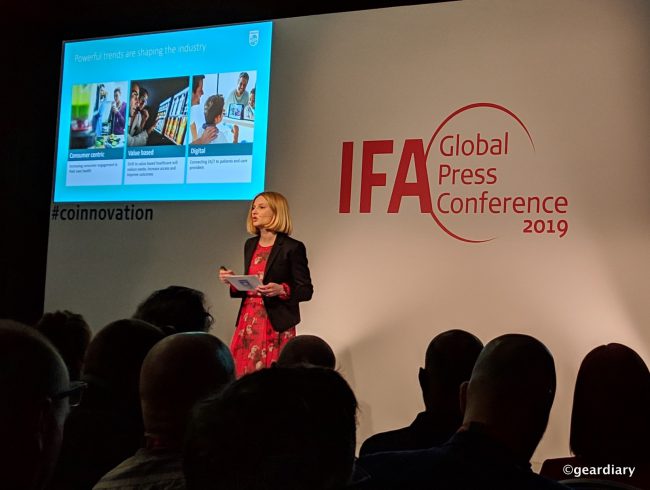
Within each company that produces health apps or products, there are many individuals who are passionate about the products produced and how those products will improve their users quality of life. During the IFA Global Press Conference, I sat down with Marlies Gebetsberger, Personal Health Leader Philips Market DACH, to chat about her role at Philips and personal health accountability.
Gear Diary: Tell me about your role at Philips.
Marlies Gebetsberger: I’ve been recently appointed as Personal Health Leader for the Market DACH of Germany, Austria, and Switzerland. That was actually three weeks ago. I’ve been with Philips now for four and a half years, previously in marketing roles for personal health and also for coffee, and I am very excited to have this new role.
Gear Diary: What do you love most about your job?
Marlies Gebetsberger: I just love the entrepreneurial spirit of our company. I think if you see a relevant idea that really meets consumer insights, and you’ve got the right case around it, you can do it. And that’s very motivating to me.
Gear Diary: How is Philips helping consumers find personalized health solutions?
Marlies Gebetsberger: I think the most important thing is that we really start as a consumer-centric company with our consumers, with their insights, and what are the triggers and worries that they have with their daily challenges. Based on that, we are developing solutions relevant to answering those problems.
Gear Diary: What do you think are the biggest challenges for people who are interested in improving their health, but who might not know how or where to start being accountable?
Marlies Gebetsberger: I think the most important thing is to transparently show how easy it actually can be to take personal leadership for [your own] health and to have it under control. And the challenge has a lot to do with how easy it is to get access to that information and how easy it is to turn that information into relevant actionable insights. A good example, I think, is Pregnancy+ (“Pregnancy Plus”), which is an app that we at Philips are providing for pregnant women but also for future dads that basically helps to see in a very transparent way how the pregnancy is going, how far has it developed, how is your child actually developing, and the heart of it is a recommendation engine based on artificial intelligence provides articles and recommendations that is really needed for the consumer.
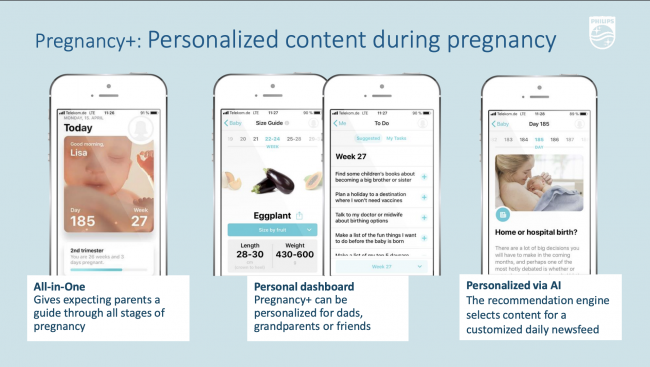
Gear Diary: What do you think are the most significant ways that digital health products can improve lives?
Marlies Gebetsberger: It depends on which state of the health continuum the consumers are; when we talk about healthy living, a very important area is health and nutrition, as we all know. We believe at Philips that homemade food is really important, so we want consumers to have the opportunity in a very convenient way to prepare healthy meals themselves. For example, with the Philips Airfryer, we have been doing this for a couple of years very successfully; this year at IFA, we will launch the next generation of air fryers that will work with an integrated sensor which will actually adjust the temperature and the time settings perfectly for the dish that you want to prepare.
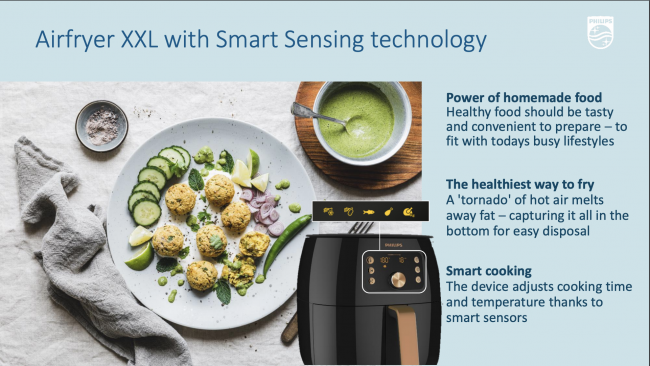
Another example is the application of Artificial Intelligence. We are using data and the ever-increasing cloud computing power, smart sensor technologies, wearable devices, fully mobile connectivity, advanced algorithms, and AI to create user experiences that are context-aware, adaptive and highly personalized. This enables them to address the motivations, characteristics,
and needs of you as a unique individual and will help you through optimized coaching or to stay adherent to a therapy.
Gear Diary: How does Philips plan to work in and with the larger ecosystem of existing digital health solutions?
Marlies Gebetsberger: One important pillar that we are currently working on is the Philips Sonicare teledentistry approach. It has been successfully introduced in the US, and this year we are bringing that idea into the European markets. The idea is really to get a data-driven, insight-driven approach for both consumers and dentists, and moving from a punctual interaction where from time to time, in the worst case when you have a problem you’ll meet a dentist, to a more ongoing, always on engagement between a dentist and the consumer. For example, you might be able to have an immediate interaction with a dentist in case you have a question.
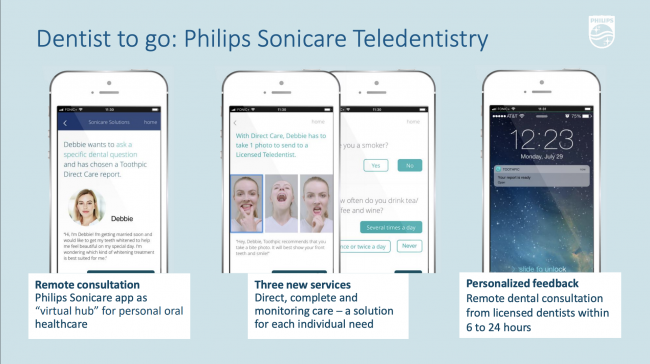
Another example is the area of Sleep where we are creating an ecosystem of connected and clinically validated professional and consumer sleep solutions to optimize a good night’s sleep and help consumers optimize their bedroom environment but also tackle any sleep problem they might have, ranging from getting too little amount of sleep to snoring to insomnia. At IFA we will showcase the latest innovations such as our Philips SmartSleep Snoring Relief Band.
Gear Diary: What message would Philips like to get out to consumers who are learning to become more involved in their own healthcare solutions?
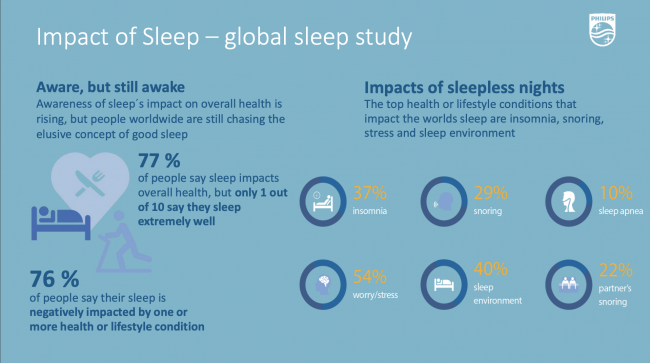
Marlies Gebetsberger: I think the most important message is that there is always a way to make life better when you start with small things. Small things add up to a big difference; it starts with healthy sleep, so be aware that getting enough sleep is really important for your health, and then it continues with health and nutrition and other areas like oral health care. We all know that oral health care has a significant impact on your overall health, so those small steps add up in your daily routine to have a healthier lifestyle.
Disclosure: I’ve just returned from the 2019 IFA Global Press Conference in Andalusia, Spain. The GPC is the yearly conference leading up to IFA in Berlin; the GPC consists of multiple power sessions throughout its two days, and it’s a time for select companies to showcase products they’ve recently released or that are coming soon to the 300 members of the media who are attending. My airfare and hotel were covered by IFA with no input regarding what I might choose to cover.
